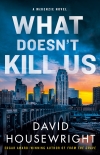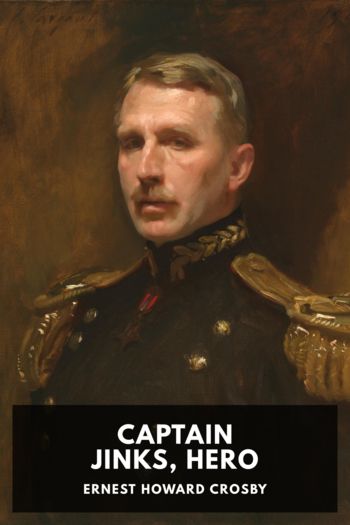What Doesn't Kill Us--A McKenzie Novel, David Housewright [best young adult book series .txt] 📗

- Author: David Housewright
Book online «What Doesn't Kill Us--A McKenzie Novel, David Housewright [best young adult book series .txt] 📗». Author David Housewright
“H.?”
“Are you involved in this somehow?”
“No.”
“Does this have something to do with one of your adventures, one of those favors that you do?”
“No, no, no. King’s name came up while I was looking into something else, is all.”
“Cuz, knowing what’s going on with King Charles, that’s the kind of insider information that could make someone very, very wealthy.”
“Seriously?”
“Seriously.”
“Well, if I learn anything, H., I’ll let you know.”
“Please,” she said.
“Before I go—what do you know about Jenna King?”
“Used to own Social King, a social media firm—apparently the Kings name everything after themselves. Social King did all right for a while. I stayed away from it, though.”
“Why?”
“I heard that Charles was calling the shots for his sister. I wasn’t sure how true that was, but it was enough for me to keep my distance. I’m not a big fan of absentee landlords.”
“The company was eventually sold.”
“Yes, it was. Which was another thing, knowing a company is being built just so it could be sold to the highest bidder—it makes me question its valuations and projections.”
“I’m not entirely sure what you’re talking about but I’m rich because of you so…”
“It’s nice to be appreciated, McKenzie.”
“Whatever happened to Jenna King, do you know?”
“I only know the rumors which, by the way, I always listen to but rarely act upon.”
“What rumors?”
“That she had personal issues.”
“Such as?”
“Drugs.”
“Drugs?”
“Haven’t you heard, McKenzie? We’re suffering through an opioid epidemic.”
Detective Jean Shipman’s phone rang. She tore herself away from my notes to answer the call. It was the man from the impound lot. He told her that he had searched my Jeep Cherokee and didn’t find any notes in unaddressed envelopes or otherwise. Shipman thanked him and noted the fact on her yellow legal pad.
She wrote down a second note as well and circled it several times.
Opioids?
EIGHT
Nina loved music almost as much as I did. Actually, she probably loved it more but hey, it’s not a competition.
She was sitting in her office, leaning back in her chair with eyes closed and listening to Mary Louise Knutson, a Minnesota pianist that she had hired many times in the past. Knutson was playing “I’ve Grown Accustomed to Her Face” soft and low on her Call Me When You Get There CD and Nina was thinking that I had been right all those times I had told her that she should go back to playing piano professionally.
Nina had played relentlessly when she was a kid; it had helped her cope with a lousy childhood. She had made money at it when she was in college, too, and during those first difficult years when she was establishing her club. Except she had stopped playing somewhere along the line. When I asked her why, she simply shrugged and said she had fallen out of the habit. I’ve often encouraged her to get back into it and from time to time she would vow to return to performing, especially after I gave her the Steinway. Only she had never followed through. I don’t think it was fear of performing. After all, she had done it before. I think it was because she had met so many great pianists over the years that she felt inadequate. She had convinced herself that she could not possibly play as well as Knutson, or Butch Thompson, the great ragtime and stride jazz pianist that she had also hired, or Peter Schimke or Laura Caviani or Chris Lomheim.
Mostly she played at home, with me lying beneath the Steinway, my head propped on a huge throw pillow with the logo of the Minnesota Twins. She’d riff on Dave Brubeck and Bill Evans or pound out Jay McShann’s “My Chile” or Otis Spann’s “Spann’s Stomp” and say, “What do you think?” and I’d tell her that I knew of a jazz joint where she could play happy hour gigs or put together a group and play the main stage. “I have connections,” I’d say. Sometimes she would crawl under the piano with me.
That’s what she was thinking of when the knock came on her door, of me and her cuddling beneath her baby grand.
“What is it?” she asked.
“Man to see you,” her bartender said.
“Okay.”
Nina said okay, but she really wasn’t, she told me later. She was tired and frustrated and angry and she was astonished at how much energy it took to be pleasant when she was tired and frustrated and angry. She was sure that the man who came to see her was another one of my friends who was anxious about my health, though, and she was determined to appear optimistic even if that wasn’t how she felt.
She stepped into the downstairs bar. The bartender gestured at a large man sitting alone at a table in the center of the room. He was dressed in a blue blazer, white shirt with blue tie, and gray slacks that reminded Nina of a uniform. She had not met the man before but that was true of most of my friends, including half the guys I’ve played hockey with over the past twenty years.
Nina forced a smile onto her pretty face and approached the table.
“Good afternoon,” she said. “I’m Nina Truhler.”
He gave her a nod and a sneer as if she was a counter clerk who had finally given him the takeout he had ordered after a long wait. He pointed at the chair across from him.
Nina nearly went off yet she managed to smother the explosion,





Comments (0)